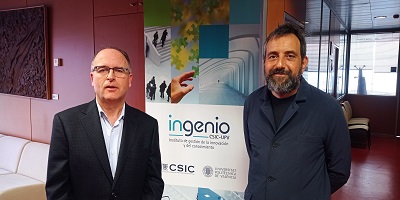Future influenza pandemics
Researchers from the INGENIO Institute, a joint centre of the Spanish National Research Council (CSIC) and the Universitat Politècnica de València (UPV), and the Fisabio Foundation have been part of the team supporting the World Health Organisation (WHO) in the development and drafting of the third implementation plan to improve global pandemic influenza preparedness and response.
This recently published document incorporates lessons learned during the Covid-19 pandemic. "The goal of this 2024-2030 plan is to strengthen pandemic influenza preparedness through a whole-of-society approach, and to ensure a more equitable response by building stronger and more resilient national capacities," says Enrique Meseguer.
Together with David Barberá, Enrique Meseguer is part of the INGENIO (CSIC-UPV) team that, in collaboration with the research staff of Fisabio's Vaccine Research Area (AIV), led by Javier Díez-Domingo, carried out this study between May and October 2022.
Jaime Fons, researcher at Fisabio, stresses that "the work of the IYV has focused on updating the evidence, analysing the recommendations arising from Covid-19 and how to incorporate them into the new WHO plan. The aim is to expand the capacities of the different countries and thus be able to respond more equitably, timely and effectively to the arrival of future pandemics and minimise the consequences for the population.
In addition, INGENIO staff, together with the rest of the international team of researchers, have carried out the stakeholder consultation process to incorporate their input into the development of the new plan through surveys and interviews with technical teams from WHO regional offices and Ministries of Health, representatives of industry sectors and civil society organisations, and staff from the Pandemic Influenza Preparedness (PIP) Secretariat.
The consultation aimed to deepen the perception of previous plans' achievements and barriers and identify areas for improvement. "Their input has been essential to ensure continuity in the support and reinforcement of the preparedness system for future influenza pandemics," says Meseguer.
One of the pillars of the plan is the adaptation and capacity building of the WHO Global Influenza Surveillance and Response System (GISRS), a platform currently comprising institutions in 125 Member States for monitoring influenza epidemiology and disease, and a global alert system for novel influenza viruses and other respiratory pathogens, through its integration with the SARS-CoV-2 sentinel systems and genomic sequencing.
"The consultation process has also highlighted the central importance of risk communication, new approaches to social listening and infodemic management, and communication training, with special emphasis on strengthening developing countries' access to pandemic influenza vaccines and other products," concludes Enrique Meseguer.
The team that has participated in the elaboration of this document is completed by specialists from different European universities and research centres, representing the firm ACT-IVD, a multinational and multidisciplinary consultancy firm focused on innovation in public health.




